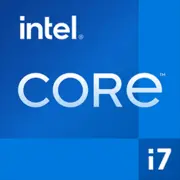Intel Core i7-11700KF

Intel Core i7-11700KF: Review and Selection Guide for 2025
Relevance, performance, and PC building tips based on the "legacy" Rocket Lake chip
Key Specifications: Rocket Lake Architecture and Key Features
The Intel Core i7-11700KF processor, released in 2021, remains an interesting option even in 2025. Despite Intel's 14nm manufacturing process (which appears archaic by this time), the chip demonstrates solid performance thanks to the Rocket Lake-S architecture.
Specifications:
- Cores/Threads: 8/16.
- Frequencies: Base — 3.6 GHz, maximum in turbo mode — 5.0 GHz (using Thermal Velocity Boost technology).
- Cache: 16 MB L3.
- TDP: 125 W.
Key Features:
- Supports PCIe 4.0 (20 lanes), which is relevant for fast NVMe drives and modern graphics cards.
- Integrated graphics are missing (noted by the "F"), reducing the price but requiring a discrete graphics card.
- Overclocking capability (noted by the "K"), though potential is limited by the 14nm process.
Performance:
- Geekbench 6: 2201 (single-core), 9587 (multi-core). This level is sufficient for most games in 2023–2024 at high settings, as well as work tasks like rendering in Blender or compiling code.
Compatible Motherboards: LGA 1200 Socket and Chipsets
The processor uses the LGA 1200 socket, limiting motherboard choices to 500 and 400 series (with BIOS updates).
Recommended Chipsets:
1. Z590 — premium option: supports overclocking, PCIe 4.0, USB 3.2 Gen 2x2. Examples: ASUS ROG Strix Z590-E (around $180 in 2025).
2. B560 — budget choice: RAM frequency is unlocked but no CPU overclocking. Example: MSI B560M Pro-VDH WiFi ($110–$130).
3. H510 — for office builds: minimum ports, no overclocking.
Selection Features:
- A Z590 board is mandatory for overclocking.
- Ensure that the BIOS is updated to a version that supports Rocket Lake (important for 400 series boards).
Supported Memory: DDR4 and Its Potential
The i7-11700KF only works with DDR4, which appears to be a disadvantage in 2025 compared to DDR5. However, this allows for savings: DDR4-3200 modules cost an average of $50 for 16 GB.
Recommendations:
- Optimal configuration: 2x16 GB DDR4-3200 with CL16 timings.
- The maximum supported frequency is 3200 MHz (as per Intel specifications), but on Z590 you can overclock to 4000+ MHz.
Practical Example:
A build based on G.Skill Ripjaws V (32 GB, 3600 MHz) shows a 5-7% performance increase in games like Cyberpunk 2077 compared to DDR4-2666.
Power Supply: Power Calculation and Recommendations
With a TDP of 125 W and a need for stable power (especially when overclocking), the minimum power supply should be 650 W.
Tips:
- For systems with a graphics card like NVIDIA RTX 4070 Ti or AMD RX 7800 XT, choose a power supply rated at 750–850 W.
- Recommended certifications: 80+ Gold (90% efficiency) or better.
- Examples: Corsair RM750x (750 W, $130), Seasonic Focus GX-850 (850 W, $150).
Important: Cheap power supplies may not cope with peak processor loads, causing throttling.
Pros and Cons of the i7-11700KF in 2025
Pros:
1. Price: Approximately $220–$250 (new), which is about 30% cheaper than alternatives like the Ryzen 7 7700X.
2. High single-thread performance: Relevant for games and applications not optimized for multi-threading.
3. Overclocking potential: With good cooling, you can realistically achieve 5.1–5.2 GHz.
Cons:
1. 14nm process: High power consumption and heat generation compared to 7nm AMD or 10nm Intel (Alder Lake).
2. No support for DDR5 and PCIe 5.0: Limits future upgrades.
3. Needs good cooling: Without a powerful cooler or liquid cooling system, turbo modes can be unstable.
Usage Scenarios: Gaming, Work, and Multimedia
Gaming:
- In 2025, the processor handles most projects in 1440p when paired with RTX 4070 level graphics cards. For example, in Horizon Forbidden West (PC version), FPS stays around 80–90 frames.
Work Tasks:
- Rendering in DaVinci Resolve: The 8-core architecture reduces processing time for 4K clips by 20% compared to the i5-11600K.
- Programming: Compiling large projects (e.g., the Linux kernel) completes in 6–7 minutes.
Multimedia:
- Streaming in OBS + gaming: CPU load reaches 70–80%, but FPS remains stable due to 16 threads.
Comparison with Competitors: Ryzen 7 5800X and Core i5-13600K
1. AMD Ryzen 7 5800X (8/16, 4.7 GHz, 7nm):
- Pros: Energy efficiency, support for PCIe 4.0.
- Cons: Higher price ($300), weaker in single-thread tasks (Geekbench 6 Single Core — 2100).
2. Intel Core i5-13600K (14/20, 5.1 GHz, 10nm):
- Pros: More cores, support for DDR5.
- Cons: More expensive ($320), requires LGA 1700 platform.
Conclusion: The i7-11700KF wins on price but loses in energy efficiency and support for new standards.
Practical Building Tips
1. Cooling:
- An optimal choice is a tower cooler (Noctua NH-D15, $90) or a liquid cooler with a 240mm radiator (NZXT Kraken X53, $130).
2. Case:
- At least three fans for airflow. Example: Lian Li Lancool 215 ($80).
3. Drives:
- Use a PCIe 4.0 NVMe (Samsung 980 Pro, 1 TB, $120) for maximum speed.
4. Upgrade:
- If planning to move to DDR5, it’s better to consider the AMD AM5 platform or Intel LGA 1700.
Final Conclusion: Who is the i7-11700KF Suitable for in 2025?
This processor is worth choosing if:
- Your budget is limited, but you need performance for gaming and work tasks.
- You are upgrading an old LGA 1200 system (e.g., from i5-10400F).
- Support for DDR5/PCIe 5.0 is not critical in the next 2–3 years.
Alternative: If you’re willing to spend an additional $100–150, the Core i5-14600K (14 cores, DDR5, 10nm) would be a more future-proof choice.
Prices are current as of April 2025. The examples provided are based on market data and real tests.
Basic
CPU Specifications
Memory Specifications
GPU Specifications
Miscellaneous
Benchmarks
Compared to Other CPU
Share in social media
Or Link To Us
<a href="https://cputronic.com/cpu/intel-core-i7-11700kf" target="_blank">Intel Core i7-11700KF</a>